| Lucas Hardwick |
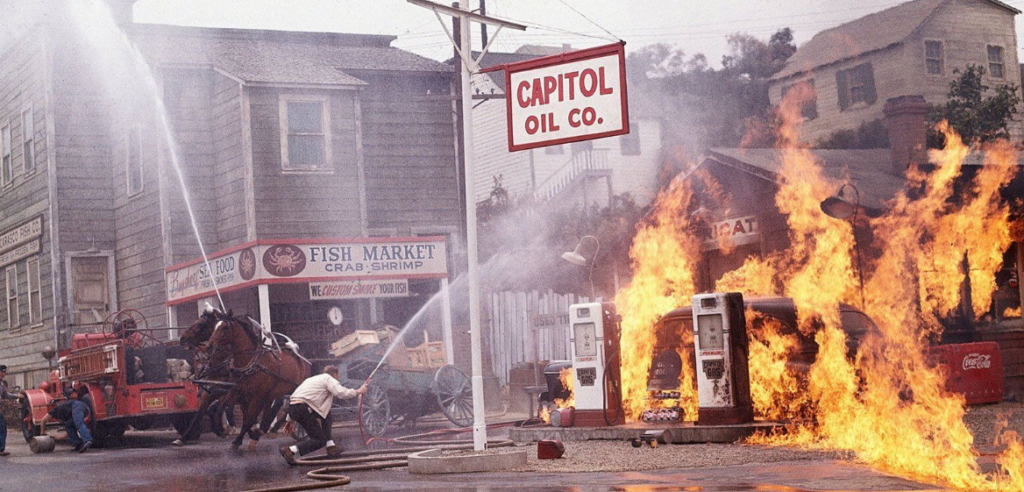
The Birds plays at the Heights Theater on Thursday, April 3rd, as part of our collaboration on the 2025 Hitchcock Film Festival. For tickets, showtimes, and other series information, visit trylon.org.
***No surprises here: spoilers ahead.***
In the broad scope of the human struggle, few things are as relentless as the churning juggernaut of unwashed laundry. Every day, we peel off layers of clothes only to put on more layers of clothes that we eventually peel off and replace again and again. Even the lucky few showboats who can consider themselves “caught up” still probably have a couple pairs of socks or underwear at the bottom of their clothes hamper. Unless you’re a multi-platinum hip-hop artist who only ever wears their blue jeans once and the next day sports a brand new pair, then you too are saddled with the grown-up responsibility of washing your own damn clothes forever and ever, Amen.
It’s a staple task whose age rivals the world’s oldest profession. Ever since Adam and Eve became too curious about mysterious taboo fruits way back at the beginning of time, in the Garden of Eden, forcing God’s hand to smite humankind with the awkward awareness of our naked bodies, we as a species have sought to be clothed, thus initiating mankind’s enduring showdown with a core housekeeping enterprise.
Sundays are a pretty special day around my house, because while the good Lord takes a knee from a week of creating, it’s the day I choose to do my best to catch up on the amount of clean clothes a family of four is gonna need for the next few days. As if a score is kept in some insinuated, existential book of records that no one but myself is concerned with, I shoulder the fabric-addled burden of washing, drying, folding, and putting-away of every stitch of clothing that was soiled throughout the week. “Well done, thou good and faithful servant; thou hast been faithful over a few things, I will make thee ruler over many things: enter thou into the joy of thy lord.”
This thankless task, however, is not without its share of roadblocks. As is mankind’s proclivity to compound his and her own difficulties, doing up a few loads of laundry is hardly as simple as sorting darks and whites into colds and hots and tossing them in the washing machine. The advent of technology that makes laundry less complicated than it was for everyone in the Old Testament still wanes in its ability to keep us from being our own worst enemy.
So often before I can wash a single thread of clothing, Laundry’s incessant positive feedback loop reveals its rigid agenda in the form of damp clothes left in the bottom of the washer from some prior failed attempt to make good on this godly duty earlier in the week. Simple enough; move it to the dryer. But oh, I say thee nay, industrious homemaker! The dryer is full of dry clothes that need to be put in the laundry basket which is subsequently filled to the brim with clothes that need to be folded and put away. Before I can even begin my own laundering journey, I have to finish no less than three heaping loads of stuff left behind amidst the week’s forgetful flurry of a home of two working adults and a pair of toddlers whose sole mission is to assure no single task is ever finished.
Isn’t washing clothes a societal-driven pressure anyway? When did everyone decide we needed to do laundry? Is laundry part of God’s eternal chastisement of humanity by way of making us stinky? Or did some Monday morning quarterback chore-Nazi show up to work looking nice and smelling fresh, setting this immortal charge in motion and coercing the world around them to follow suit?
Doing laundry is an extension of mankind’s timeless battle with his and her own failings; a microcosmic, perennial tale of suffering borne in the wake of original sin. It is a living tableau of human nature’s flaw of unnecessarily over-complicating the simple task of just surviving. And every so often we’re forced to break free from the shackles of our convoluted routine in the midst of some pre-apocalyptic context to remind us that change is an unstoppable force and an immovable object. Sometimes it’s our own dynamos of chaos in the form of two unhinged toddlers, and sometimes it’s the resolute fury of homicidal birds in biblical proportions that serve as humbling prompts to remind us that change can be good, surprise is inevitable, and maybe, just maybe, laundry isn’t that big a deal.
Bodega Bay is an entire town of people with their heads so far up their own asses they can’t remember little girls’ names or the shortest route between two places, and all of Mitch Brenner’s girlfriends are more concerned about how his mother feels about them than he does. We’ve seen it before, but not with legions of murderous birds inexplicably descending on an entire community, pecking the locals to death in the biggest by-God aviary bloodbath since the plagues of Exodus. Alfred Hitchcock’s 1963 film The Birds is an examination of what happens when simple people living overcomplicated lives are faced with the apocalyptic predicament of attempting to do things the hard way in the wake of a full-blown incursion of birds out for blood.
You say, “Lucas, isn’t The Birds just a monster movie except it’s about birds that pluck everyone’s eyeballs out for no reason?”
While that is not an incorrect assessment suggesting the film’s proto status for establishing a version of the modern day slasher, it’s a rather obtuse observation in the face of what’s really going on. The movie’s very first scene is a showcase of the human tendency for unnecessary complexity. It’s as if everyone in The Birds uses the “other leading brand” in some infomercial of life they don’t realize they’re a part of.
Tippi Hedren’s Melanie Daniels—whose Love Language™️ is breaking and entering—stops into a San Francisco pet shop to pick up a mynah bird for a friend. Well, the mynah bird was supposed to be there at 3 p.m. but it’s not, and blustery Mrs. MacGruder suggests she’ll call about its whereabouts. But no, Melanie says have it delivered to her place, but Mrs. MacGruder insists, and yada, yada, yada in a tedious communication breakdown that ends with Melanie’s understated disappointment that she will have to be the one to teach the bird to talk.
In the meantime, Rod Taylor’s Mitch Brenner—who courts women like Perry Mason at a square dance—spots Miss Daniels and proceeds to inquire about purchasing a couple of lovebirds for his 11-year old sister, implicating Melanie as one of the pet store’s salespeople. He goes on to needle Melanie about various birds in the store, putting her to task as the expert he clearly knows she’s not.
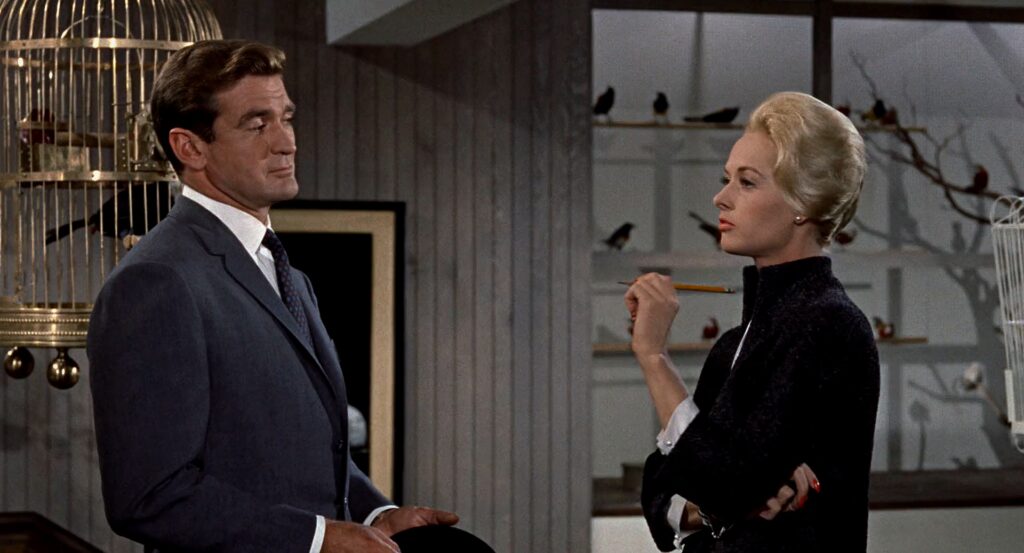
Hunky Mitch meets Melanie.
“Aren’t those lovebirds?” Mitch asks pointing to a cage full of pink birds.
“No. Those are red birds,” replies Melanie.
“Oh, I thought they were strawberry finches,” says Mitch, knowing they were never lovebirds to begin with!
But Melanie continues to play along, incorrectly pointing out canaries as lovebirds and poorly demonstrating her limited knowledge of the molting season before it’s apparent that while Melanie doesn’t know Mitch, Mitch knows Melanie and they both know she doesn’t know jack squat about working in a pet store. It’s ennui soaked, flirtatious subterfuge that could have been avoided in spite of the ruthless human quality for pedantic neuroses that dates back to dabbling in forbidden fruits.
Human silliness only compounds from this point forward. Melanie buys the lovebirds for Mitch and learns that he weekends up in Bodega Bay—though the cozy seaside community is only 60 miles up the road, she seems completely clueless about it. Mitch’s neighbor tells Melanie its an hour and a half by freeway and two hours by coast highway, and in her own complicated manner, Melanie takes the long way in her little Aston Martin DB2/4 Mk 1 coupe. The coincidence of the bird wings belonging to the Aston Martin logo extrapolating the film’s gratuitous bird theme and suggesting Melanie’s invasion of a socially isolated town should not be lost on audiences.
While some might say all this is splitting hairs (or feathers) in the name of exposition—as well as a case for my own inclination to overthink—the scene where Melanie asks the Bodega Bay general store clerk about Mitch Brenner’s sister is a meticulously elaborate bit of business that winds up miles (literally and figuratively) from where it starts.
Melanie wants to leave a note for Mitch’s sister but doesn’t know her name. Well, the clerk says her name’s Alice while his assistant says it’s Lois, and Melanie wants answers. The clerk proceeds with a convoluted set of directions—“Go straight through town till you see a little hotel on your left. Then you turn right there. Near the top of the hill, you’ll see the school, and just beyond a little house with a red mailbox”—to school teacher Annie Hayworth’s (Suzanne Pleshette) house, who apparently is the only person in town who knows the little Brenner girl’s name is Cathy.
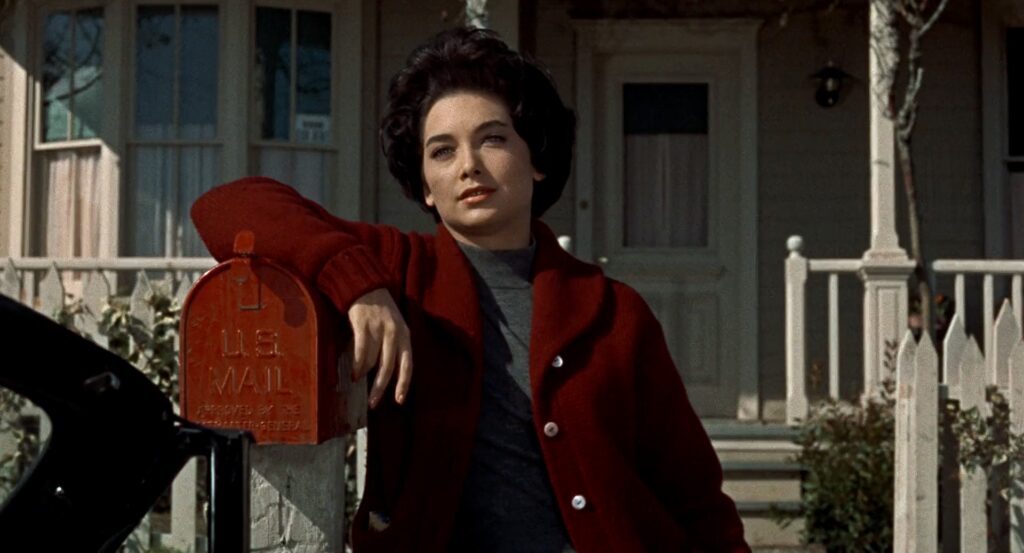
Total babe, Annie Hayworth.
Can you feel me breaking the fourth wall? Melanie’s only response to such a gross inaccuracy is remarking not that “Cathy” sounds nothing like “Alice” or “Lois” but that the clerk “seemed sure it was either Alice or Lois.” Annie flippantly adds, “Which is why the mail never gets delivered to the right place in this town,” insinuating complications from the top down. It doesn’t bother either of the women that Cathy’s actual name isn’t even close to the name she’s mistaken for by the clerk, and that, in general, mistaken identity is real problem for the people of Bodega Bay. It’s the most chilling and telling moment in the film, culminating the story’s exposition to reveal that an egregious lack of awareness and the human capacity to unintentionally overcomplicate is a concerning affliction inherent to the denizens of Bodega Bay.
Back in town, since Melanie had insisted upon surprising the Brenners with the pair of lovebirds and since unexpectedly driving up to the house wasn’t good enough for her, she goes an even more difficult route in what amounts to a similar payoff by chartering a John boat to putt across the bay so she can literally break into the Brenner home and make her delivery. Seeing Melanie with her nose held high in her cute green wool getup as she steers the little outboard across the water is a pridefully bitchy moment; this aristocratic, big city woman attempting to make an impression upon a man in the guise of surprising a child. It’s really pretty gross and you kind of hate Melanie Daniels for a moment. Almost as if to suggest she somehow had it coming for her haughty endeavor, a gull appears out of nowhere and pecks Melanie across the forehead in the satisfying first bird attack of the film as Mitch waves her to shore on her way back to town.
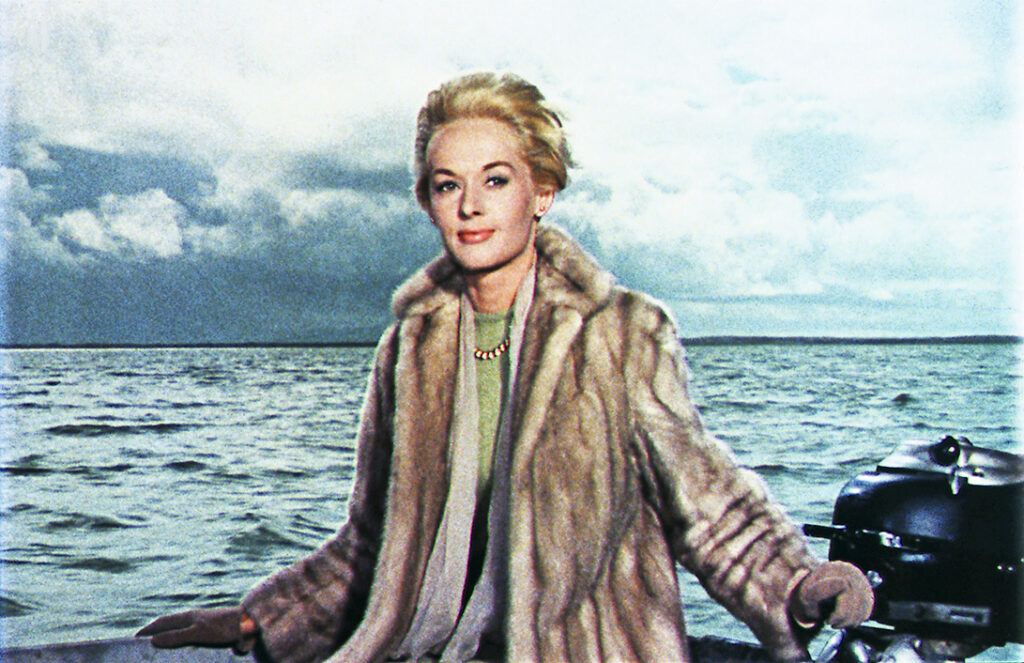
Bitchy.
Incidentally, Melanie is set up as the antagonist of the film. When Mitch finally reveals how he knows her after pestering her in the pet store, he confesses that he’s seen her in court for pulling some practical joke that resulted in breaking a plate glass window. In spite of her put-together airs and her newspaper-owning-daddy pedigree, it seems to be Melanie’s world and everyone else is just living in it. She may be pretty and only a little charming, but we’re warned to proceed with caution because her past suggests a tendency for erratic behavior. And in Bodega Bay, a town she’s unaware of and where everyone knows everyone even if they don’t know their correct names, Melanie is an element of surprise no one is equipped to handle.
Furthering the potential for antagonism, the relationships amongst the film’s characters set up all kinds of possibilities for conflicts that never materialize. We learn that Annie is an ex-lover of Mitch establishing the prospect for jealousy-charged cat-fights between her and Melanie. Annie affirms the coldness of Mitch’s mother we all catch a glimpse of when she meets Melanie. And Mitch ostensibly puts Melanie on trial about some mildly unsavory activity she was involved in on a trip to Rome. Mitch Brenner is primed for a full-on Sunday night main event for his affections by surrounding himself with every form of female endearment available. His mother, sister, girlfriend, and ex-lover are all in his immediate proximity, and they all want a piece of him.
We see these adversarial connections, yet none of them culminate into full-blown conflict, making us as viewers complicit in the film’s theme of overthought complication. Everyone gets along amicably in spite of our human desire to see them settle their little soap opera scores with the likes of satisfying backstabbing betrayal. In this way, the film is telling us the same stuff about ourselves as it is about its own characters.
At the same time, in moments like when Melanie breaks down her labyrinthine weekly itinerary for Mitch, we’re aware enough to see the blatant flaws of the human capacity for silly complexities. When Mitch asks Melanie what she does all week, she reveals that she has “several jobs.” On Mondays and Wednesdays she works for the Travelers’ Aid at the airport. On Tuesdays, she takes a course in General Semantics at Berkeley, and on Thursdays she has her meeting and lunch that somehow has something to do with sending a little Korean boy to school. And then, after some introspection about her getting her shit together, Melanie actually says, “on Mondays and Thursdays, I keep myself busy.” WTF? She just laid out her entire week, and still didn’t get it right on the recap, and in the meantime, we’re all scratching our heads about what Melanie does all week and when exactly she does it. We can’t keep it straight, but she doesn’t know she can’t keep it straight.
While we’re all excited to see hell-birds descend upon these bumbling people and their byzantine lives, the plot of the film has less to do with the birdpocalypse and is simply about the strange, unfulfilling courtship of Melanie Daniels and Mitch Brenner. Without the onslaught of the occasional surprise bird attack, we have a pretty boring tale that equates to a feeble rehash of the melodramas of Douglas Sirk and Nicholas Ray. It’s boring people attempting to make their boring lives seem less boring. They’re figuratively dead, just bopping around Bodega Bay and never getting past first base on anything. Sure, it’s got some creepy moments, The Birds may be like a horror film, but it is not a horror film. It’s a rather dull spoof punishing the ridiculous propensities of histrionic people who hate surprises with inscrutable terror.
“Bullshit!” you say.
Enter Bodega Bay’s convenient ornithologist: crotchety, curt, and at last the film’s the foremost official on birds, Mrs. Bundy (Ethel Griffies), who smokes unfiltered cigarettes and wears dark colors and berets before Labor Day.
As Melanie rather inaccurately breaks down the recent terror reigned upon Bodega Bay over the phone to Daddy Newspaper, Mrs. Bundy butts in to correct and clarify her loose appraisal of the aviary onslaught. Establishing herself as the primary authority on birds, providing genus and species denominations for blackbirds and crows, for all intents and purposes, Mrs. Bundy is emblematic of birds in human form. While Mrs. Bundy has doubts about birdie brainpans’ capacity to launch massed attacks, she’s very clear about the role of mankind. Mrs. Bundy explains that “birds are not aggressive creatures, Miss. They bring beauty into the world. It is mankind, rather, who insists upon making it difficult for life to exist upon this planet.”
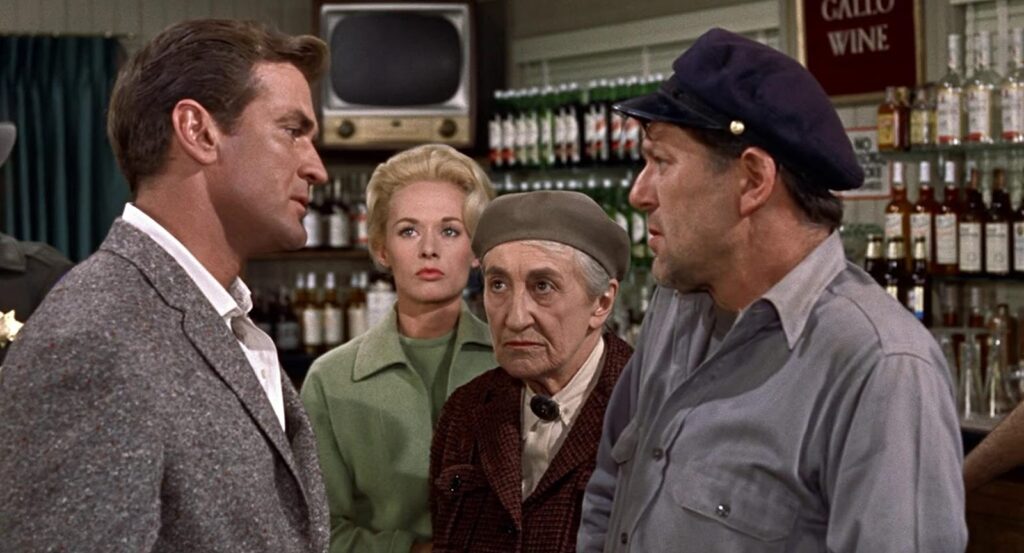
Bird whisperer Mrs. Bundy (center) sets everyone straight about mankind.
Straight from the bird’s beak.
Mrs. Bundy’s insistence that birds bring beauty and are incapable of organized terror, and that man only makes life difficult upon this planet, along with everyone else’s predilection to dramatize just about everything in the their lives suggests that maybe these bird attacks are purely symbolic and what we see unfold is an exaggerated projection of simply birds in migration—one of nature’s many signifiers of change, and we know how everyone in Bodega Bay really hates surprises. Annie even acknowledges it with an air of indignation earlier in the film: “Do they ever stop migrating?”
The bird attacks are mankind insisting upon making it difficult for life to exist upon this planet because it’s not the birds that are mixing things up for the folks of Bodega Bay; it’s their own perception of change and deviation from the status quo and their inability to cope with it. When a town is so backward and unaware that the mailman can’t keep names straight, then you better believe a new person in coming around who deigns to offer surprise gifts is gonna seem like the fucking apocalypse.
And though we know how Mitch feels about Melanie, the jury is out regarding his mother’s fondness for her during most of the film. If there’s any meaningful conflict in the story, it’s mercurial Melanie seeking to win over the impenetrable Mrs. Brenner (Jessica Tandy). It’s not until the climactic bird barrage on the Brenner home that leaves Melanie half pecked to death and in the car with Mitch and his darlings as they depart for refuge that Mrs. Brenner, in a quiet, emotional climax, accepts Melanie, illustrating the burgeoning range of the human capacity for change, and Melanie had to damn near die to get it.
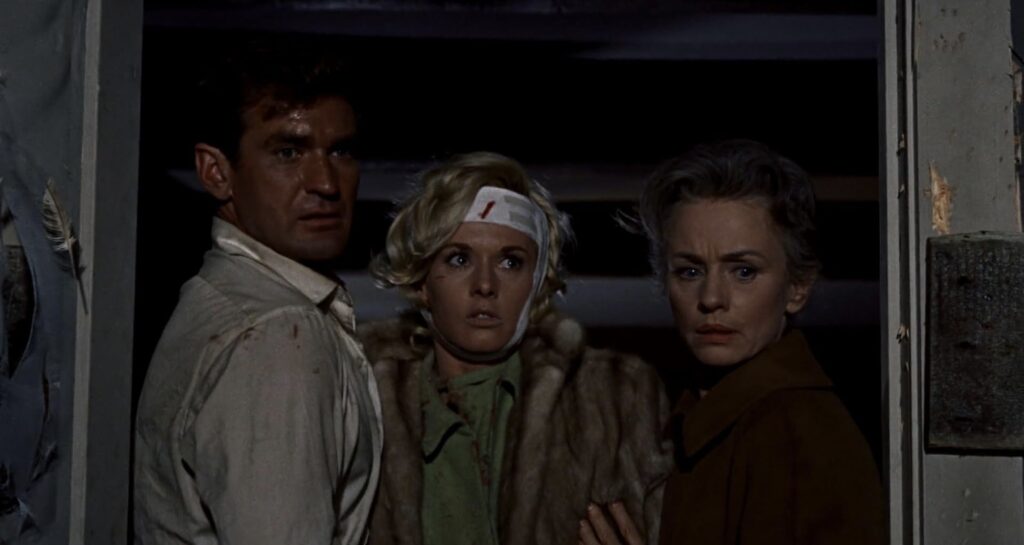
“Mom says now that you nearly died, you’re finally good enough, Mel.”
The element of surprise and change is not something anyone in Bodega Bay is comfortable with. It’s why the arrival of Melanie Daniels fails to initiate conflict when conflict would otherwise be raring to go. These folks are non-confrontational so they project their anxiety with any type of dissension onto the present winged migration. If perception is reality, then the birdemic in Bodega Bay serves as a wake-up call to its good, if uninspired people. None of their suffering may actually be as intense or real as it seems to them, but that’s just it; it is real to them, and be it the element of surprise, unstoppable change, or the combination of both in a Melanie Daniels-shaped bird plague, suffering is relative.
Edited by Olga Tchepikova-Treon
